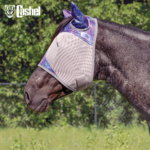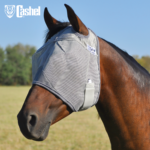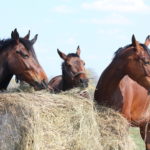If you have browsed through the feeds section of your feed store you may have seen some reasonably priced all-stock feeds that are labelled for use in both horses and other animals such as sheep, cattle and goats. One reason for the lower price is they often have less, if any, vitamin and mineral supplementation. That alone isn?t necessarily a problem, but other things could be.
Lower-quality grains, often not screened for fungal toxins, may be used in these feeds. they’re also usually least-cost formulated, meaning whatever is cheapest at the moment will be used in the ingredients. They may contain high-oil ingredients like rice bran or seed meals that haven’t been properly stabilized and may go rancid easily.
Protein sources may not be the best choice for horses, such as cottonseed meal which can contain the toxin gossypol. Be particularly wary if the feed is pelleted or contains pellets. Pelletizing makes it impossible for you to see exactly what is in them. Pellets may be made from fine pieces of broken grain that have the highest risk of fungal toxins. Their higher moisture level also makes pellets mold quicker than whole grains. This may be going on inside the pellets, where you can’t see it. Ruminants (animals with a forestomach like cows, goats and sheep) are much more tolerant of these things than horses are.
Nonspecific signs of toxic and/or low quality feed include unexplained weight loss, which may paradoxically worsen if you increase the amount of feed, poor hair coat, bloated appearance, low energy and gut upset including increased gas, change in manure consistency, even colic.
Since all blood leaving the GI tract passes through the liver first, increase in liver enzymes on blood work is very common, especially the enzyme GGT, which is the most sensitive. With heavy toxin burdens, actual liver damage can occur with backup of the pigment bilirubin in the blood, making the horses jaundiced.
The effects of specific fungal toxins are not well studied in horses. However, as a rule animals with a simple stomach, like the horse, are much more sensitive to fungal toxins. Effects depend on the type of toxin but virtually any body system could be involved ? brain, nerves, skin, muscles, heart, liver, intestinal tract, urinary tract. Sudden death is also possible.
Bottom Line:We recommend you stick with feeds formulated specifically and only for horses. We don’t think the few dollars you may save on a multi-stock feed are worth the risk.
Editor?s Note:
We recently received phone calls from subscribers in the Midwest who were seeing some odd problems in their horses, including increasing feed and noting increasing weight loss, as well as hives and colicky symptoms. They said their veterinarians wondered if this may be traced to the feed they were using at the time, although this is not proven to be the cause. The feed was an all-stock type that contains pellets. They asked us to pass the word along to about considering the feed you’re using when odd symptoms start appearing.
Horse Journal staff article.





